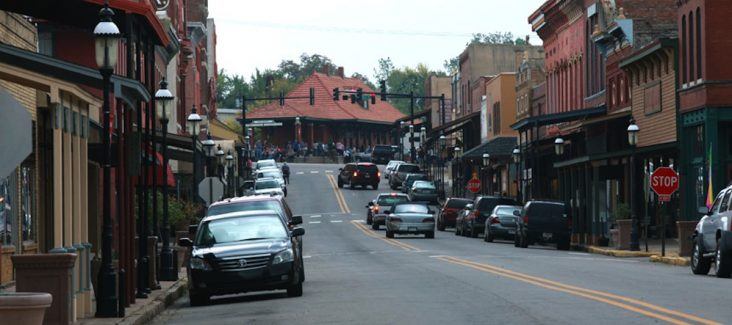Van Buren Original launches ‘tactical urbanism’ project downtown
by October 20, 2016 3:02 pm 439 views

Downtown Van Buren
Van Buren Original (VBO), the effort to revitalize the city’s historic downtown area, has made it a goal from the beginning to play the short game as well as the long, according to organizers.
Meetings of the group emphasize the overall vision, but focus on what can be done immediately to take steps toward the overarching goal. This week VBO began taking some of those steps with a “tactical urbanism” project along Main Street. Tactical urbanism is an umbrella term used to describe a collection of low-cost, temporary changes to an environment, intended to improve local neighborhoods and city gathering places.
For VBO, it means “trees, scrubs, traffic control devices and pop-outs will be installed along the street to try out over the next four to six weeks,” lead organizer Rusty Myers said in an email.
Pop-outs are designed to improve the safety of intersections. Construction typically expands the sides of each corner one car lane to accommodate more people as they wait to cross a street.
This week, city personnel have been on Main Street bringing in and laying out various materials that VBO was able to pull together, including 15 trees, 50 scrubs, and several mum plants provided by Sharum’s Nursery, and 24 traffic control bollards from Time Striping.
Bollards are short, thick posts usually found on the deck of a ship or a wharf, but on streets, they are used to divert traffic from an area or road.
Myers credited Van Buren Mayor Bob Freeman and Joe Hurst, the city’s planning director, in assisting with implementation of the plan, “getting the necessary approvals from the Highway Department” and “committing city personnel and equipment to make it happen.”
Galen Hunter and Tim Varner of the MAHG Architecture firm have also guided VBO through the process and provided design suggestions.
Van Buren’s Advertising and Promotion (A&P) Director Maryl Koeth pitched in to launch the group’s official Facebook page earlier in the week to “provide a place for the public to make comments and for us to provide information about the project and its purpose,” Myers said. “We’ll be publicizing it and having it posted as a link on other community organizations’ sites.”
“This is a test and nothing is being permanently installed. It’s a ‘test before we invest’ approach to see what works and what doesn’t, with the objective being to help make downtown more pedestrian friendly, walkable, appealing, (and) inviting. So we’re wanting comments and criticism, constructive or otherwise — and no doubt we’ll get a bunch of both,” Myers said.
The tactical urbanism project will encompass blocks 400 through 700 of Main Street. The block 800 depot area has been excluded from the effort, Myers continued, because “that’s a state highway, with restrictions we’re not yet ready to address, and because the area in front of the depot will be under construction as part of the new Veterans Park project.”
VBO kicked off earlier this year and has hosted a number of group and individual committee meetings over the last six months with its kickoff meeting being held in May. The objective is to bring both public and private sectors together to promote and grow businesses and activities in the area.
Prior to the tactical urbanism project, the group launched a “Living Local” initiative consisting of extended business hours from 17 of 34 total merchants in the downtown area and a number of themed events each Thursday from October through mid-December.
The two efforts — tactical urbanism and Living Local — build on mounting momentum from the $4 million Center for Arts and Education facility now in fundraising with construction slated for 2017 and the $1.7 million Veterans Park, which broke ground in June.
